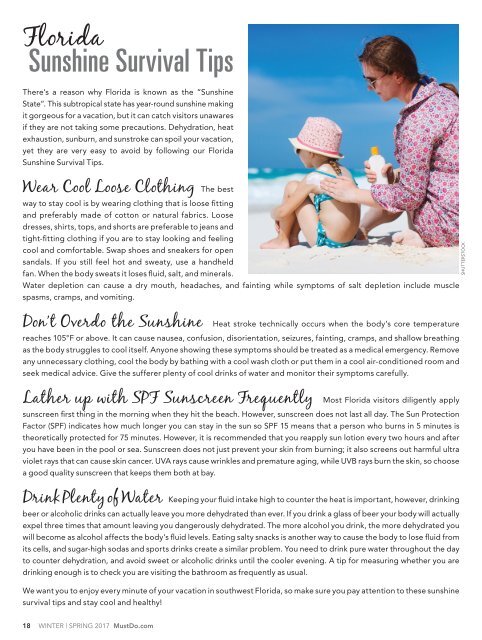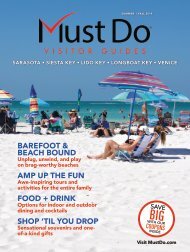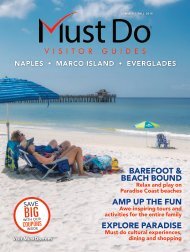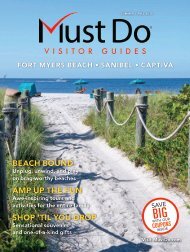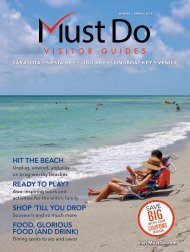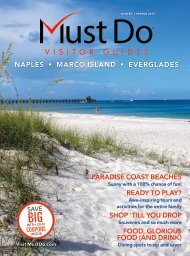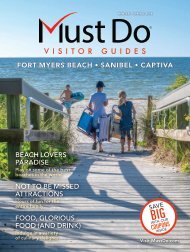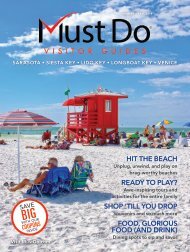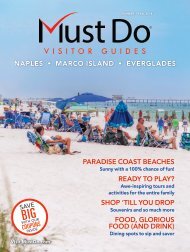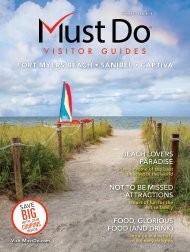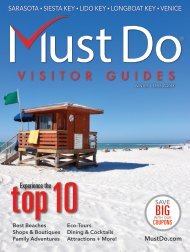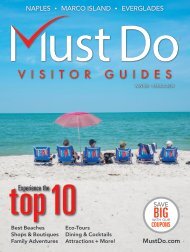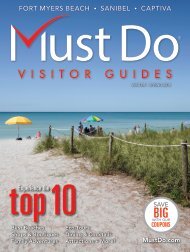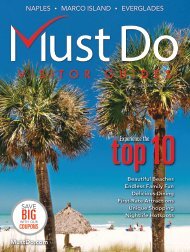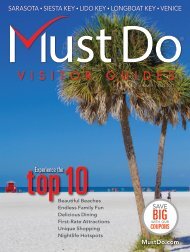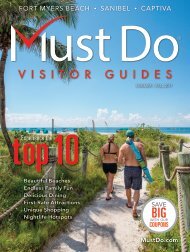Must Do Naples Visitor Guide Winter/Spring 2017
At Must Do Visitor Guides we believe the best experiences in life are better when shared, and so we do. Inside this Naples Summer/Fall 2017 issue, you will find over one hundred well-researched and carefully curated standout things to do so you can make the most of your visit. Everything from major attractions to awe-inspiring tours or family activities conveniently arranged in our Top 10 directories. Our dining and nightlife recommendations take the guesswork out of where to find a great meal or drink. You can make your experience here even more spectacular with our valuable deals and savings.
At Must Do Visitor Guides we believe the best experiences in life are better when shared, and so we do. Inside this Naples Summer/Fall 2017 issue, you will find over one hundred well-researched and carefully curated standout things to do so you can make the most of your visit. Everything from major attractions to awe-inspiring tours or family activities conveniently arranged in our Top 10 directories. Our dining and nightlife recommendations take the guesswork out of where to find a great meal or drink. You can make your experience here even more spectacular with our valuable deals and savings.
You also want an ePaper? Increase the reach of your titles
YUMPU automatically turns print PDFs into web optimized ePapers that Google loves.
Florida<br />
Sunshine Survival Tips<br />
Florida is a<br />
Birdwatcher’s Paradise<br />
There’s a reason why Florida is known as the “Sunshine<br />
State”. This subtropical state has year-round sunshine making<br />
it gorgeous for a vacation, but it can catch visitors unawares<br />
if they are not taking some precautions. Dehydration, heat<br />
exhaustion, sunburn, and sunstroke can spoil your vacation,<br />
yet they are very easy to avoid by following our Florida<br />
Sunshine Survival Tips.<br />
Wear Cool Loose Clothing The best<br />
way to stay cool is by wearing clothing that is loose fitting<br />
and preferably made of cotton or natural fabrics. Loose<br />
dresses, shirts, tops, and shorts are preferable to jeans and<br />
tight-fitting clothing if you are to stay looking and feeling<br />
cool and comfortable. Swap shoes and sneakers for open<br />
sandals. If you still feel hot and sweaty, use a handheld<br />
fan. When the body sweats it loses fluid, salt, and minerals.<br />
Water depletion can cause a dry mouth, headaches, and fainting while symptoms of salt depletion include muscle<br />
spasms, cramps, and vomiting.<br />
<strong>Do</strong>n’t Overdo the Sunshine Heat stroke technically occurs when the body’s core temperature<br />
reaches 105°F or above. It can cause nausea, confusion, disorientation, seizures, fainting, cramps, and shallow breathing<br />
as the body struggles to cool itself. Anyone showing these symptoms should be treated as a medical emergency. Remove<br />
any unnecessary clothing, cool the body by bathing with a cool wash cloth or put them in a cool air-conditioned room and<br />
seek medical advice. Give the sufferer plenty of cool drinks of water and monitor their symptoms carefully.<br />
Lather up with SPF Sunscreen Frequently Most Florida visitors diligently apply<br />
sunscreen first thing in the morning when they hit the beach. However, sunscreen does not last all day. The Sun Protection<br />
Factor (SPF) indicates how much longer you can stay in the sun so SPF 15 means that a person who burns in 5 minutes is<br />
theoretically protected for 75 minutes. However, it is recommended that you reapply sun lotion every two hours and after<br />
you have been in the pool or sea. Sunscreen does not just prevent your skin from burning; it also screens out harmful ultra<br />
violet rays that can cause skin cancer. UVA rays cause wrinkles and premature aging, while UVB rays burn the skin, so choose<br />
a good quality sunscreen that keeps them both at bay.<br />
Drink Plenty of Water Keeping your fluid intake high to counter the heat is important, however, drinking<br />
beer or alcoholic drinks can actually leave you more dehydrated than ever. If you drink a glass of beer your body will actually<br />
expel three times that amount leaving you dangerously dehydrated. The more alcohol you drink, the more dehydrated you<br />
will become as alcohol affects the body’s fluid levels. Eating salty snacks is another way to cause the body to lose fluid from<br />
its cells, and sugar-high sodas and sports drinks create a similar problem. You need to drink pure water throughout the day<br />
to counter dehydration, and avoid sweet or alcoholic drinks until the cooler evening. A tip for measuring whether you are<br />
drinking enough is to check you are visiting the bathroom as frequently as usual.<br />
We want you to enjoy every minute of your vacation in southwest Florida, so make sure you pay attention to these sunshine<br />
survival tips and stay cool and healthy!<br />
18 <strong>Winter</strong> | <strong>Spring</strong> <strong>2017</strong> <strong>Must</strong><strong>Do</strong>.com<br />
Shutterstock<br />
By: Gillian Birch<br />
Whether you enjoy birdwatching to spot new species, or to<br />
capture them on photographs, Florida has plenty of great<br />
spots for finding flocks of birds. Many bird species spend<br />
the winter in Florida. Others stop to rest on Florida’s lakes<br />
and marshes en route to warmer destinations along the Gulf<br />
migration flyway. Southwest Florida has some of America’s<br />
top refuges for spotting rare and unusual birds, from waders<br />
and ducks to impressive birds of prey.<br />
The best time to spot perching birds in their natural habitat<br />
is during the early hours after sunrise or just before sunset.<br />
If you want to get up close, wear light colored clothing that<br />
blends in with nature and does not rustle as you walk. Move<br />
slowly and stay quiet to get the best results, whether you<br />
are hiding or watching from a natural lookout point.<br />
Stay away from nests, especially if they contain eggs or<br />
young birds. Never touch a nest or remove an egg as the parent<br />
may desert the nest, leaving the young birds to starve.<br />
SHUTTERSTOCK<br />
Jennifer Brinkman


